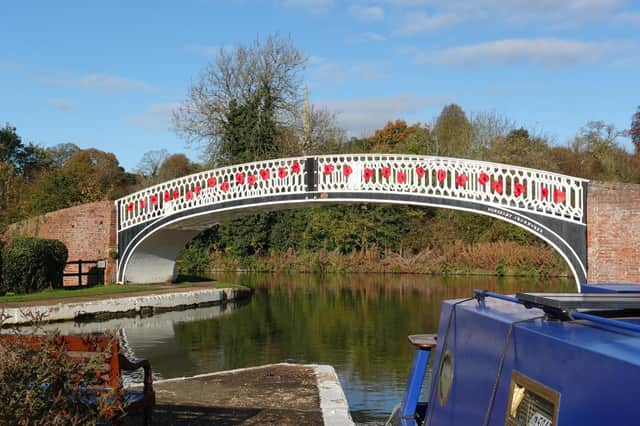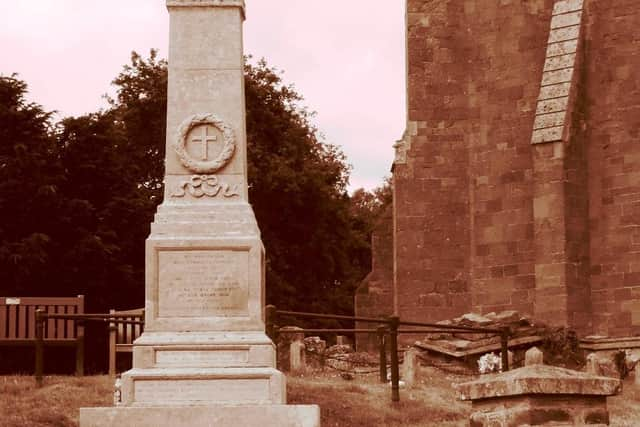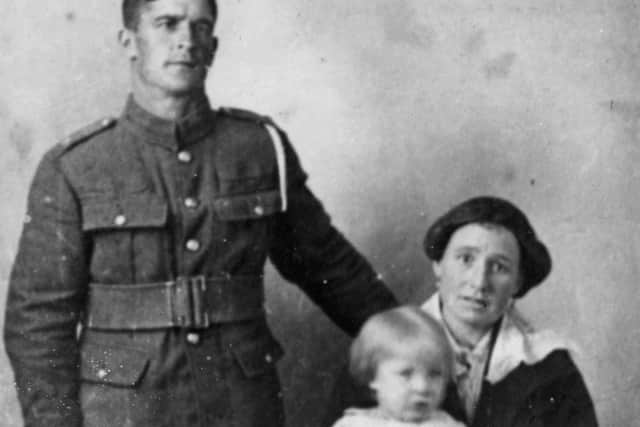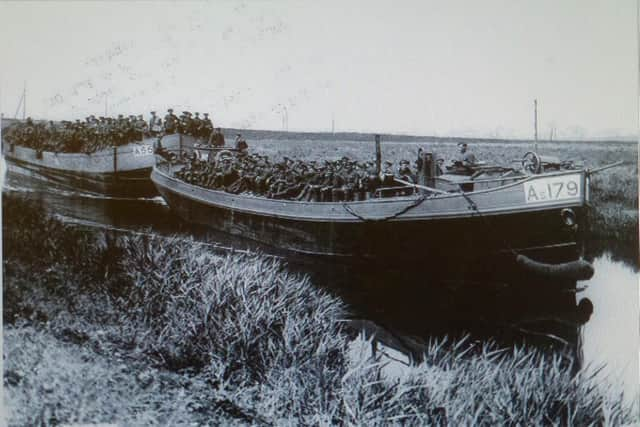Braunston Marina director remembers role of Midlands boatmen in World War I


Braunston lost one of the highest number of casualties in WWI of any local villages – with 31 in all, for a village of only 1,800 residents as recorded in the Census of 1911.
Seven of them are believed to have been boatmen, the youngest only 17, who only survived about three weeks on the Western Front.
Advertisement
Hide AdAdvertisement
Hide AdTim writes: "Very little is known about the role of our boatmen in WWI. The reason for this was quite simple: the boatmen were very much an isolated and illiterate community at the outbreak of the war. Those who became directly involved in it, seem to have left nothing in terms of accounts, or even letters home or diaries. In WWII the same might well have happened, except for the books and diaries written by the middleclass female volunteers, the Idle Women, who worked the canals as boatmen, leaving us with a profound insight into the boatmen’s way of life in the twilight of the working canals.


"So what did the boatmen do? At the outbreak of war in 1914, there was no military conscription, and it did not really come in until 1916. From the outset, the boatmen were seen as an important reserve occupation, vital in the movement of heavy goods, especially iron and coal, which were essential to war production.
"But whilst military service remained voluntary, there was an hysteria towards fit and able young men who seemed to be shirking the war - especially amongst women who had lost husbands and brothers. To overcome this, the government issued a badge to wear for those in essential war production, which included the boatmen.
"However many young boatmen did volunteer for the army - for a variety of reasons, including the relatively good pay, getting away from the crowded living conditions on the boats, and the excitement of going to France to fight, and going there with their pals. They tended to join the county regiments along the canal routes. The Braunston boatmen volunteers mainly signed up with the Northampton and Warwickshire regiments. Further south it was the Ox & Bucks and the Middlesex, and further north, the Staffordshire and Manchester regiments, and so on. Of the 31 named dead on the Braunston village war memorial, six at least and probably eight were boatmen, and this was from just one canal village community.
Advertisement
Hide AdAdvertisement
Hide Ad"At the outset of the war, the government pledged not to send teenage volunteers to the front, and volunteering was only for those over eighteen. But the recruiting sergeants soon overlooked these requirements, and turned a blind eye to the ruses used to join up. A young Kendall from Braunston is recalled by his descendants as volunteering at 14, using his much older brother’s birth certificate. Amazingly he survived.


"But he was a lucky one. His cousin Clarence Kendall, who joined the Bedfordshire Regiment, was one of the Braunston six that were killed, having survived until the 23rd March, 1918, when he died – no record of how or exactly where - during the great German March offensive. He was only 19, and has no known grave. Another Braunston man was Harry Lewin, who joined the Northamptonshire Regiment at the outset, and was killed in action in northern France as early as 9th May, 1915. He was aged only 17. The 1911 Census has him with his parents aboard the NB Venice at Middlewich, recorded one of only ‘two surviving children’. These tales show the scale of loss and human suffering for the families.
"In the summer of 1916, all unmarried boatmen under the age of 25 were eligible for call-up. After the fiasco of the Battle of the Somme later that year, it was commonly agreed that the bad communications to the Front were partly to blame. Prime Minster Lloyd George now appointed Eric Geddes, Goods Manager of the large and successful North Eastern Railway - ‘a man of push and go’ - to take charge of all transport in the British Sector, sending him to the Western Front with the rank of Major General.
"Part of his reforms were for the two inland waterways leading to the British Sector - the Pas de Calais to Ypres and the River Somme from the Channel coast to Peronne - to be taken over and run by British boatmen. They would enlist as sappers (privates) in the Royal Engineers, Inland Waterways and Docks. Some boatmen who had already joined the army were pulled out of the line to join the sappers. Others were recruited from the major canal carriers like Fellows, Morton & Clayton, some of whose boatmen were already experienced in operating steam-motorised rather than horse-drawn boats.
Advertisement
Hide AdAdvertisement
Hide Ad"One FMC man so called-up was the recently married Braunston boatmen Michael Ward, who enlisted in late 1916, he having served on the steamer Vulcan. Ward was sent for training on wide-beamed boats on the canal at Devizes, and then over to France. His work there would have involved moving goods and troops to the Front, and coming back, bringing out the wounded.


"Whilst being a boatman was much less hazardous than being in the front line, the boatmen were at times well within the range of the guns and attacks by German planes. On one occasion a kind French woman had offered to go and get Ward a drink from a nearby tavern. As she was walking back carrying a tray, and only a few hundred yards away, he saw her hit by a shell and blown to pieces.
"Ward was amongst the lucky ones. He returned safely in 1919 to meet his wife Susan and two year old daughter Rose, who was being carried by her pregnant mother when he departed for the front. A family photograph survives from that time.
"Susan had spent the rest of the war working in the boatyard at Batchworth Locks, Rickmansworth. She was working on a boat in one of the double locks, which was empty, when a Zeppelin dropped a bomb which hit the other lock, causing mayhem. Miraculously Susan survived.
Advertisement
Hide AdAdvertisement
Hide Ad"Michael Ward was given a special medal for the spotlessly clean way he had kept his boats on the Western Front. On discharge he was offered a de-mob suit, or allowed to keep his uniform, which he chose. He wore the battle dress jacket on the canals for at least another twelve years – as did many other boatmen who had likewise served on the Western Front."
Comment Guidelines
National World encourages reader discussion on our stories. User feedback, insights and back-and-forth exchanges add a rich layer of context to reporting. Please review our Community Guidelines before commenting.